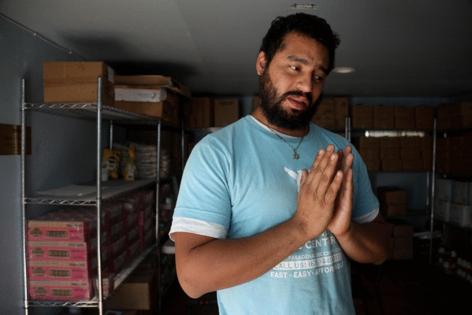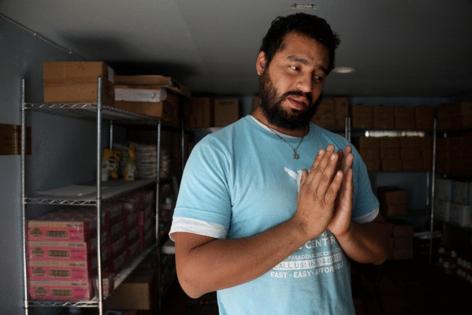California immigrants prepare for a second Trump administration
Published in News & Features
WASHINGTON — The morning after former President Donald Trump won a second term on a promise to deport millions of immigrants, a line formed outside a Riverside County, California, legal aid organization before it had even opened its doors.
Legal permanent residents wanted help applying for citizenship. Asylum seekers who had given the federal government their home addresses wondered whether they should pack up and move.
A woman in the country illegally told the organization that her children had refused to go to school because they feared she would be detained while they were away. A man said he had stayed home from his landscaping job.
"It's all hands on deck right now," said Luz Gallegos, executive director of the TODEC Legal Center. "We have to prepare for the worst."
Trump has listed mass deportations and the curtailing of temporary legal status for millions of immigrants as among his top priorities. His newly appointed "border czar," Tom Homan, said Monday that the Trump administration will prioritize deporting people who are living in the country illegally and pose a threat to public safety. He also said officials will increase workplace raids as part of a crackdown on labor and sex trafficking.
"If sanctuary cities don't want to help us, then get out of the way, because we're coming," Homan said in an interview on "Fox & Friends."
California leaders and immigrant rights organizations are responding with promises of legal action and assurances to protect immigrant residents from Trump policies. Gov. Gavin Newsom last week called a special session of the Legislature to safeguard the state's progressive policies, including on immigration. California Atty. Gen. Rob Bonta has vowed to defend the state's policies in court.
Advocates are urging the Biden administration to bolster protections for immigrants ahead of Trump's inauguration by redesignating certain countries for temporary protected status and prioritizing pending work permit applications.
In California, they hope to expand programs offering pro bono legal representation to immigrants facing deportation proceedings. They will also push local governments to enshrine sanctuary policies that go beyond the state's sanctuary law.
During Trump's previous term, advocates for immigrants held frequent "know your rights" sessions and encouraged families to establish contingency plans. Parents signed guardianship agreements allowing family members or friends to care for their children if they were detained. Immigrants carried business cards listing their rights (ask to see a warrant, request an attorney, remain silent) and the phone numbers for rapid-response networks that would go to the scene of an immigration arrest.
Now organizations across California are mobilizing the same tactics to prepare for another Trump administration. They are trying to walk a fine line between being realistic about possible federal actions and not adding to people's fears.
"We take him at his word," said Angelica Salas, executive director of CHIRLA — the Coalition for Humane Immigrant Rights in Los Angeles. "Members of immigrant rights organizations are completely clear-eyed about the fact that what is coming toward us is cruelty and manufactured pain for political outcomes."
Salas said CHIRLA has received inquiries from schools, health clinics and labor unions to do on-site "know your rights" sessions. Advocacy organizations are also coordinating to maximize their reach. Last week CHIRLA joined hundreds of organizations in launching "We Are California," an effort that aims to, among other things, rebuild rapid-response networks.
Nana Gyamfi, executive director of the Black Alliance for Just Immigration, who is based in L.A., said she particularly worries that Black immigrants will face heightened racism because the Trump campaign stoked lies that Haitian immigrants were eating pets in Springfield, Ohio.
"You can tell people are tired," she said, "because we know as Black people that the hammer comes down on us harder."
Joao Morales, 29, moved to Los Angeles from Nicaragua in August 2023 under the Biden administration's program offering legal entry and temporary work permits to immigrants from certain countries who obtained financial sponsors.
Amid the uncertainty of what another Trump administration could mean for his ability to stay in the U.S., he has been attending meetings organized by the National Day Laborer Organizing Network to teach immigrants throughout the country to advocate for themselves.
"With everything he has been saying and everything he plans to do to the migrant community, it's not looking good," Morales said. "The most important thing is that we unite."
Still, several organizations expressed concern about how much it will cost to inform immigrant residents, provide legal representation to those facing deportation, resist federal infringement and advance local policies that will bolster protections for immigrants. They also face a more limited landscape of legal options, as the judiciary is more conservative because of judges Trump appointed in his first term.
"We don't have the courts like we did last time, but we still have the Constitution, we still have civil rights, we still have local laws," Salas said.
Advocates also plan to push back against efforts to expand immigrant detention facilities and ensure the state utilizes its watchdog powers. A new California law allows county health officers to inspect immigrant detention facilities. But GEO Group, which operates most of the state's facilities, sued last month, saying the requirement significantly burdens federal immigration enforcement in violation of the Constitution.
"We've been here before," said Talia Inlender, deputy director of the Center for Immigration Law and Policy at UCLA. "And we know how to fight back."
People who came to the U.S. as children and now have temporary status under Deferred Action for Childhood Arrivals, the Obama-era program that protects them from deportation and allows them to work legally, are also concerned about their futures under a second Trump term.
Born in Yugoslavia, Edvin Dapcevic has lived in the U.S. since he was 4. He is an executive who leads a sales team at a major tech company in Los Angeles, and asked that The Times not name the company publicly.
Dapcevic said Trump's election has forced him to begin thinking about moving to another country, which would mean leaving behind his mother, a permanent resident, and brother, a U.S. citizen.
He noted that tech leaders such as Elon Musk and David Sacks, both South African immigrants who supported Trump's bid for reelection, have been vocal about the U.S. needing highly skilled immigrants. He said he wishes he could tell them and the president-elect about the hundreds of thousands of DACA recipients such as himself, who have already been vetted and could fill that gap.
"I don't have a concrete future in this country," Dapcevic said. "I grew up here, pay taxes, have never been in trouble, never been arrested. I'm forced to identify [what country] might give me a permanent home — and it saddens me to say that America has not done that."
Last week at TODEC, the legal aid organization in Perris, one of the people who showed up seeking advice was another DACA recipient, Marta, who asked to be identified only by her first name. The 23-year-old from Mexico said she fears being laid off from her restaurant job.
She worries even more about her parents, who are in the country illegally. During Trump's last presidency, when they were afraid immigration agents would show up at their door, the family put a tinted film over their windows that blocks people from seeing in but allows them to see out.
"The fear of deportation worries us the most," she said. "He started off strong during his first term, and this time I feel like he might come stronger."
©2024 Los Angeles Times. Visit at latimes.com. Distributed by Tribune Content Agency, LLC.










Comments